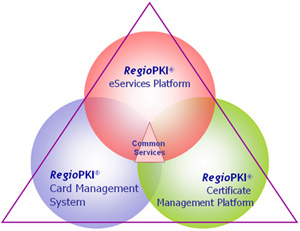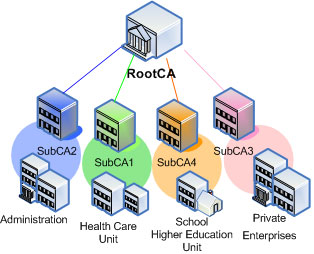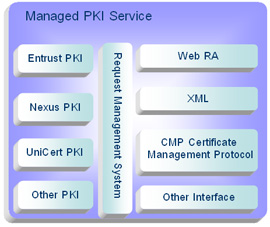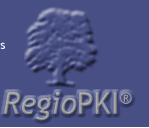Taking possibilities to concrete benefits
The
benefits of using PKI are increasingly established as the need for
realibility, security, turst and privacy is more and more evident for
eGovernment, eServices and eHealth. Numerous applications domains
require certificate based PKI-solutions:
- PKI based strong authentication
- Digital signatures with non-repudiation
- Access to secure web-services
- Document work flow management
- Domain log-on
- Secure email
- Digital signature archive services
- Paperless processes
However, several challenges related to the adoption of PKI services
have to be resolved before the benefits can be leveraged. First of all
the underlying complexity of a PKI service makes it difficult and risky
to set up without a clear long term business strategy to support it.
Secondly the cost to set-up and smoothly scale-up certificate service
remains prohibitively high. These considerations have driven
organisations to demand managed PKI services from neutral, certified
and experienced technical operators for PKI systems.
Overview
The main modules of the RegioPKI® system are:
- The
PKI, or Certificate Management Platform to provide electronic
certificates for authentication, electronic signature, encryption, etc.
- A Management System for SmartCards and other tokens including contactless RFID and mobile solutions
- The RegioPKI® eServices Platform, based on OSCI protocol (On-line Services Computer Interface, XML encryption and signatures)
These modules can be taken into use independently, depending on the
actual level of ICT-based services, processes, needs and future plans. |
 |
The
RegioPKI® managed PKI service is provided by BBS, which is the largest
PKI-operator and development environment in the Nordic region. Having
worked with PKI systems since 1997, Nets has built expertise in
delivering different types of PKI systems and custom solutions to
virtually every customer group. Operating many different PKI systems
from one hosting center at BBS directly translates into tremendous cost
effectiveness and reduced time to implement the full and final
solution.
A hierarchy of trust
Trust
and security between users and organisations is the basic and the most
important element in the digital world – without these features there
is no electronic transactions or eBusinesses.
The
RegioPKI® system forms a secured network of trust between the regional
private or public users for their daily needs, work or businesses.
The
system enables all regional public or private organisations, entities,
business communities and other actors to start using secure paperless
eServices and processes based on strong authentication and electronic
signature.
This also includes new secure working practices, mobile working methods like telework and eBusinesses. |
 |
The RegioPKI® Managed Wireless PKI Service
Nordic
region is also one of the world's most mature markets in mobile
services. The RegioPKI® managed Wireless PKI service from Nets, serves
Regional Government organisations, telecom operators, ID-schemes,
financial institutions and enterprises who wish to exploit PKI based
strong authentication and signature services in mobile channel.
One Interface, One Client, Multiple Services
PKI Request Management System
The
PKI Request Mamangement System (RMS) from Nets is a PKI Administration
System helping Regional Government organisations that issue RegioPKI®
certificates, to effectively manage the order and distribution across
various ID's and certificates, PKI-platforms and CA-systems. RMS
supports both the PKI-based and non-PKI based schemas. RMS is fully
standards based and comes with a well documented implementation and
integration guide. RMS includes interfaces towards all popular
CA-platforms. The deployment, integration, administration training and
support services are provided by us.

RMS Clients The
Request Management System includes different kinds of clients: RMS API,
Web RMS and Local RMS clients. Alternatively the customer can choose to
implement a full XML interface to its CA system operated at BBS. These
clients give the user different interfaces towards the RMS depending on
the different requirements. The RMS API greatly simplifies an
integration of customer solutions with the RMS. The Web RMS is a web
application used for certificate management through the RMS. This
client can be customized for special requirements. The Local RMS is a
client installed on a PC and is specialized for certificate management
on smart cards.
What is a Public Key Infrastructure
-
PKI is an ICT system (software, hardware, cryptographic technology and
protocols) and enables structured, highly secured management of
identities, personal data and registries and the management of
registries.
- A certificate
creates an electronic identity to the person concerned by merging the
Certifier’s Public Key with the user’s personal data
- PKI enables electronic / digital signatures, strong authentication, data integrity, non-repudiation and confidentiality.
-
Strong identification of user-applicant (passport-level documents are
required) is applied during the registration process, allowing the
issuance of various certificates (signature, authentication,
encryption, etc.) according to the user’s needs.
-
Watertight authentication control of users / identities based on the
PKI key pair system (public and private/secret keys) is applied when
using electronic identity for various applications within ICT systems
and networks.
- PKI offers
Real Security – it is the only technology to guarantee strong security,
far beyond the passwords and similar systems (e.g. GSM-mobile telephone
security, non-standard legacy systems, or proprietary systems).
- PKI
is the only generally accepted technology, which fulfils the trust and
security requirements of electronic data and information management
within ICT systems.
What does PKI do?
- PKI
offers Access Control to information and valuable data systems, based
on strong authentication of user identity and rights. Role-based access
rights can be determined individually using Identity Management Systems
(IMS).
- Digital signatures
are to certify the non-repudiation of legally binding electronic
transactions, data, information or documents – this may cover all
interactions carried out electronically privately or at work e.g.
within businesses, administrations, production, etc.
-
Electronic transactions carried out within systems based on other than
PKI authentication procedures (e.g. passwords), do not replace digital
signatures, as the validity of these actions are limited to the system
itself. For example, a password-based approval of an e-invoice might be
valid in the system, but it is neither legally binding nor auditable if
archived electronically outside the same system.
- Electronic / Digital signatures offer the only standardised or generally accepted format for marking “approval”.
- According
to various studies, strong authentication with Single Sign On (SSO)
offers remarkable opportunities for efficiency improvements and savings
within the organisation and its value chains and processes.
|

















